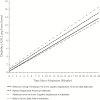Long-Term Care Residents' Geriatric Syndromes at Admission and Disablement Over Time: An Observational Cohort Study
- PMID: 29955879
- PMCID: PMC6521919
- DOI: 10.1093/gerona/gly151
Long-Term Care Residents' Geriatric Syndromes at Admission and Disablement Over Time: An Observational Cohort Study
Abstract
Background: Disablement occurs when people lose their ability to perform activities of daily living (ADLs) like bathing and dressing, and is measured as the rate of increasing disability over time. We examined whether balance impairment, cognitive impairment, or pain among residents at admission to long-term care homes were predictive of their rate of disablement over the subsequent 2 years.
Methods: Linked administrative databases were used to conduct a longitudinal cohort study of 12,334 residents admitted to 633 long-term care (LTC) homes between April 1, 2011 and March 31, 2012, in Ontario, Canada. Residents received an admission assessment of disability upon admission to LTC using the RAI-MDS 2.0 ADL long-form score (ADL LFS, range 0-28) and at least two subsequent disability assessments. Multivariable regression models estimated the adjusted association between balance impairment, cognitive impairment, and pain present at admission and residents' subsequent disablement over 2 years.
Results: This population sample of newly admitted Ontario long-term care residents had a median disability score of 13 (interquartile range [IQR] = 7, 19) at admission. Greater balance impairment and cognitive impairment at admission were significantly associated with faster resident disablement over 2 years in adjusted models, while daily pain was not.
Conclusions: Balance impairment and cognitive impairment among newly admitted long-term care home residents are associated with increased rate of disablement over the following 2 years. Further research should examine the mechanisms driving this association and identify whether they are amenable to intervention.
Keywords: Activities of daily living; Disability; Geriatric syndrome; Nursing homes.
© The Author(s) 2018. Published by Oxford University Press on behalf of The Gerontological Society of America.
Figures

References
-
- Canadian Institute of Health Information: When a Nursing Home is Home: How do Canadian Nursing Homes Measure up on Quality. Toronto, ON: Canadian Institute of Health Information; 2013.
Publication types
MeSH terms
Grants and funding
LinkOut - more resources
Full Text Sources
Other Literature Sources
Medical
Research Materials
Miscellaneous

